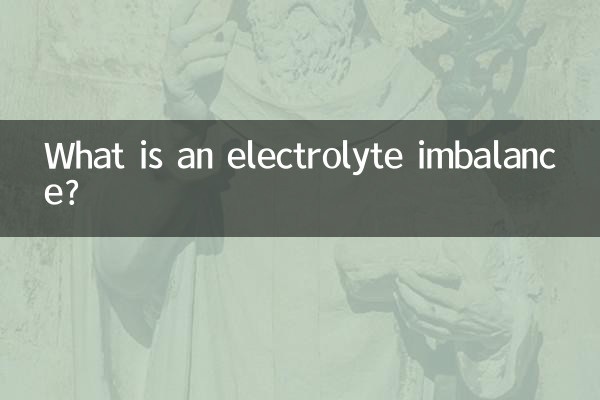What is an electrolyte imbalance?
Electrolyte imbalance refers to the abnormal concentration of electrolytes (such as sodium, potassium, calcium, magnesium, etc.) in the human body, which may be too high or too low, thus affecting normal physiological functions. Electrolytes play a key role in maintaining fluid balance, nerve conduction, muscle contraction, and more. In recent years, with the increase in health awareness, electrolyte imbalance has become a hot topic. The following is the relevant content and structured data that have been hotly discussed across the Internet in the past 10 days.
1. Common causes of electrolyte imbalance

Electrolyte imbalance can be caused by a variety of factors, but here are some common causes:
| Reason | Specific performance |
|---|---|
| dehydration | Loss of electrolytes due to heavy sweating, diarrhea, or vomiting |
| Unbalanced diet | Lack of electrolyte-rich foods such as fruits and vegetables |
| Abnormal kidney function | The kidneys are unable to effectively regulate electrolyte balance |
| drug side effects | Medications such as diuretics and antibiotics may affect electrolyte levels |
2. Symptoms of electrolyte imbalance
Symptoms of an electrolyte imbalance vary depending on the specific electrolyte type and degree. Here are some common symptoms:
| Electrolyte type | Hyposymptoms | Hypersymptoms |
|---|---|---|
| Sodium (Na⁺) | Headache, nausea, fatigue | Thirst, confusion, convulsions |
| Potassium (K⁺) | Muscle weakness, irregular heartbeat | Palpitations, numbness, chest pain |
| Calcium (Ca²⁺) | Muscle spasms, brittle nails | Constipation, kidney stones, bone pain |
| Magnesium (Mg²⁺) | Anxiety, insomnia, muscle tremors | Drowsiness, hypotension, respiratory depression |
3. How to prevent and treat electrolyte imbalances
Preventing and treating electrolyte imbalance requires comprehensive adjustments to diet and lifestyle habits:
| measures | Specific methods |
|---|---|
| balanced diet | Consume electrolyte-rich foods such as bananas (potassium), dairy products (calcium), nuts (magnesium) |
| Appropriate amount of hydration | Supplement drinks containing electrolytes after exercise and avoid drinking large amounts of pure water |
| Monitor health status | Regular physical exams, especially kidney function and electrolyte levels |
| Rational use of medication | Use medications that may affect electrolytes as directed by your doctor |
4. The relationship between recent hot topics and electrolyte imbalance
In the past 10 days, discussions on electrolyte imbalance across the Internet have mainly focused on the following aspects:
| hot topics | Related content |
|---|---|
| Summer heatstroke prevention | Excessive sweating leads to loss of electrolytes, which need to be replenished in time |
| recovery after exercise | Controversy over the choice and efficacy of electrolyte drinks |
| weight loss diet | Extreme diets may cause electrolyte imbalances |
| COVID-19 sequelae | Some patients develop symptoms of electrolyte imbalance |
5. Summary
Electrolyte imbalance is a common health problem that can be caused by a variety of factors, including dehydration, an imbalanced diet, illness, or medications. The symptoms are diverse and can even be life-threatening in severe cases. Electrolyte imbalances can be effectively prevented and treated through a balanced diet, adequate hydration, and regular monitoring. Recently, as health topics have become more popular, electrolyte imbalance has also become the focus of public attention. Understanding its causes and countermeasures can help you better maintain your health.

check the details

check the details